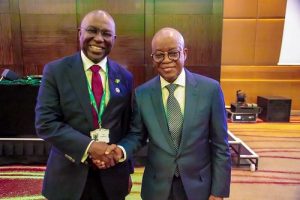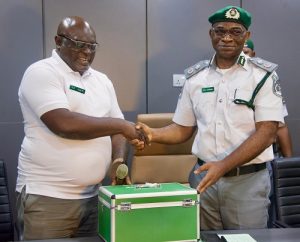Shell Signs On to Test All-Robotic Platform for Subsea Inspection

CREDIT THE MARITIME EXECUTIVE
Determined to boost Nigeria’s export and import trade, through standard and quality products, the Standards Organisation of Nigeria (SON) has entered strategic partnership with the Nigeria Ports Authority (NPA) to tackle the influx of sub-standard products into the country.
The synergizing arrangement by the two key federal agencies becomes critically crucial for the overall good of the nation’s economy especially concerning ways to tackle the issue of sub-standard products in order to allow the circulation and sale of only quality products.
This would create jobs, employment opportunities, increase revenue as well as grow the nation’s economy.
At a strategic meeting on Wednesday in Lagos between the Director General, SON Mallam Farouk Salim and Managing Director, NPA, Muhammed Bello-Koko together with their teams, both agencies agreed on the need for effective collaboration and synergy in order to ensure result-oriented and seamless operations.
Both agencies also agreed to collaborate to promote speedy processing of goods for exports, maintaining that it would help to increase the nation’s non-oil exports.
According to Bello Koko, SON’s participation at the inspection and examination of cargoes with its technical expertise and equipments would help to reduce time frame in the clearance processes at the nation’s entry points.
“We work with SON to ensure it discharges its duty effectively. I am sure SON will also work with other sister agencies without issues, “NPA boss enthused.
Muhammed Bello-Koko also said SON would also play active role in the Export Processing Zones meant to fast-track Nigeria’s exports drive and promotion
He explained that as part of the Federal Government’s efforts to boost Nigeria’s foreign trade via exports, NPA and SON would collaborate on the Export Processing Zone to ensure quality goods and services.
The NPA Managing Director further disclosed that both organizations would deliberate on the personnel and equipment to be utilized following the presidential approval for Export Processing Terminals.
Earlier in his remarks, DG, SON, Mallam Farouk Salim regretted that the influx of substandard products has been a big challenge in the concerted efforts of relevant agencies and stakeholders towards growing the nation’s economy.
According to him, the situation has been partly responsible for the increase of unemployment rate and poor wealth creation in the country, adding that all hands should be on deck to tackle the problem.
Farouk said SON would be ready to avail its services such as Management Systems Certifications and other training services to NPA personnel to increase efficient service delivery.
On his part, the NPA boss said he would present the NPA Academy Curriculum to attract SON input while welcoming SON offer to train the staff.
He commended the leadership of SON for piloting various initiatives not only to repositioning SON but achieve the agency’s statutory mandate.
Shell Signs On to Test All-Robotic Platform for Subsea Inspection
(TME) Uncrewed offshore survey and inspection company Nauticus Robotics has reached an agreement with Shell on a program to develop and mature its systems for inspecting subsea infrastructure. Working with inspection tooling service providers, Shell and Nauticus will work on operational qualification for Nauticus’ Aquanaut and Hydronaut autonomous platforms.
Nauticus has ordered an initial production run of 18-meter uncrewed workboats (dubbed Hydronauts) which will support launch/recovery, comms, and charging for an onboard AUV system (Aquanaut). The autonomous, untethered Aquanaut is designed to perform survey, maintenance and subsea intervention work – without the cost and carbon footprint of a large crewed survey vessel. Most of this subsea work is carried out today by human-controlled Remotely Operated Vehicles (ROVs), which are tethered and require a much larger vessel platform to launch and recover.
“Implementing our supervised autonomous method – one that has proven more robust and dynamic than most of its kind – is expected to provide our partner and future customers more than 50 percent cost savings compared to today’s methods of operation,” said Todd Newell, the SVP of Business Development for Nauticus.
Working with Shell, Nauticus will test out its uncrewed operating concept for the specialized task of subsea inspection. An initial feasibility study for the project was recently completed, and the team has moved into the operational qualification phase. This focuses on testing out the operation of the robotic Hydronaut/Aquanaut pair using supervised autonomy and tool control. Nauticus’ acoustic underwater comms technology enables tetherless operation while retaining oversight of the work.
“This project aims to fundamentally improve how we collect subsea facility data, through the combination of ‘AUV native’ tooling design, supervised autonomy, and recent improvements in remote communications,” said Ross Doak, Deepwater Robotics Engineer on Shell’s robotics team.
The robotic vessel/submersible combination is attracting multiple developers in the subsea space. Ocean Infinity’s Armada program plans for a fleet of 23 unmanned AUV carrier / survey vessels, and its first hulls are currently under construction at Vard Vung Tao. The Wilhelmsen/Kongsberg-backed Reach Subsea USV-ROV program is also comparable, though smaller in scale.
*Culled from The Maritime Executive





